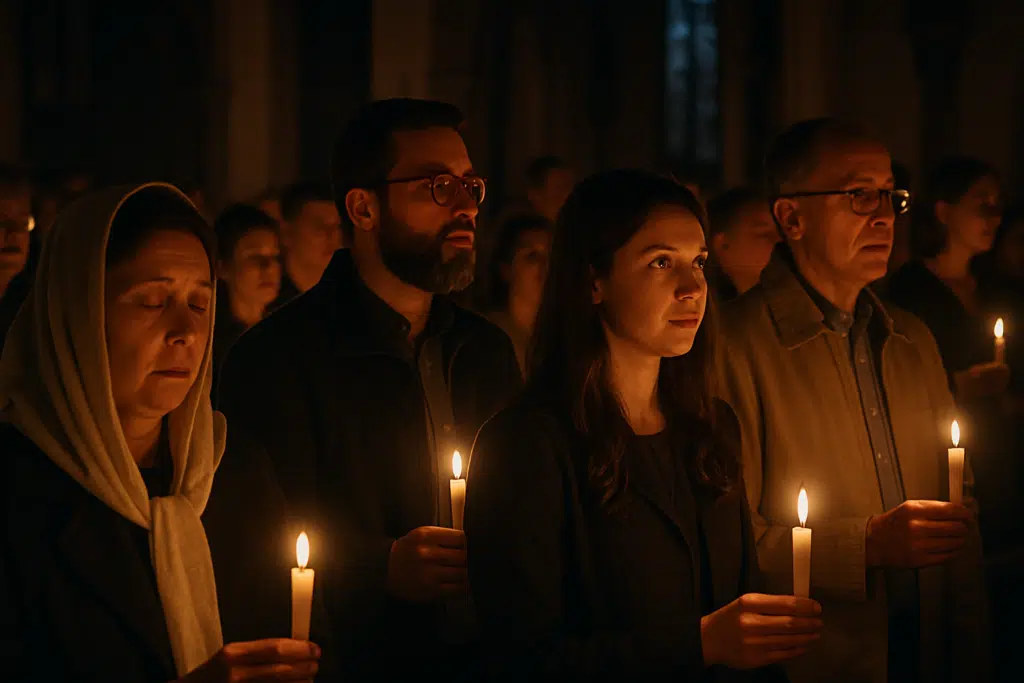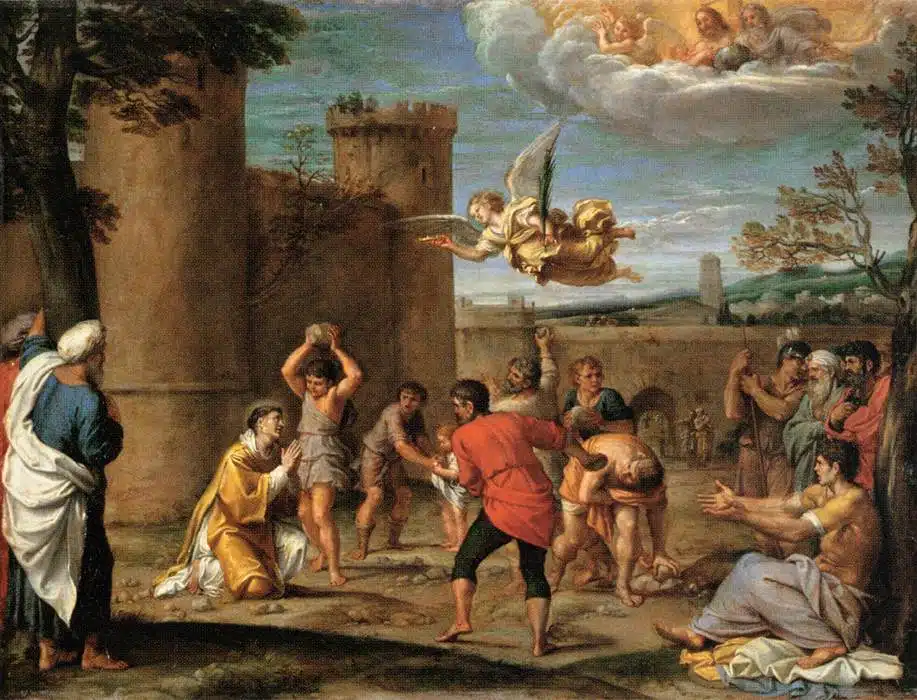What Easter Teaches Us About Human Dignity

“In a world where everything is on the same level, everything becomes sadly equal. A profane, I would even say a profaned, world is a joyless world. Basically, the loss of the sense of the sacred is reason for sadness. How enchanting it is for a young altar server to approach the altar for the first time! His joy is that much greater because he is approaching God. To do so, he has put on the sacred garment of his ministry. The sacred is a precious good; it is the door by which joy enters into the world. It offers us a share in profound joys. Who has not trembled profoundly during the Easter Vigil while following the flame of the Paschal candle in the night? Who has never tasted the spiritual joy produced by singing the Gregorian chant, Salve Regina, in a monastery? The shiver of fear that it inspires is a thrill of joy.”
― Cardinal Robert Sarah, The Power of Silence
I have quoted the above passage from Cardinal Robert Sarah’s remarkable book, The Power of Silence, in previous columns around the Easter Season. However, I wanted to put it before your eyes once again this year. I encourage you to read it slowly, meditatively.
There are many wonderful moments in the liturgical life of the Church. There is the quiet, peaceful solemnity of Christmas Eve Mass, the sobering but rich realism of Ash Wednesday (“Remember man that thou art dust…”), and the stillness and awe of silence in the church on Good Friday that creates room for reverence, reflection, and grief.

However, it is hard to think of a moment that is richer in meaning and beauty than the singing of the Exultet at the Easter Vigil. At this moment, the church is engulfed in darkness, except for the flicking flames of hundreds of hand-held candles, and the much larger flame of the newly blessed Easter candle.
“Exult, let them exult, the hosts of heaven,” sings out the priest or deacon. “Exult, let Angel ministers of God exult, / let the trumpet of salvation / sound aloud our mighty King’s triumph!”
In a world riven by sin and death, we hear a trumpet blast proclaiming the Good News. “Christ has Risen!” goes the traditional Easter greeting, followed by the response, “Indeed, He is Risen!” The ancient prayer of the Exultet explores this mystery with a profound and moving poeticism.
Easter and Human Dignity
All moments of the liturgical calendar are full of encouragement for the pro-life movement. But it is in the Resurrection, above all, that we find the profoundest affirmation of the goodness of human life, of the great dignity which human beings possess and of the destination towards which they are called.
“This is the night, / when Christ broke the prison-bars of death / and rose victorious from the underworld,” proclaims the Exultet. “O wonder of your humble care for us! / O love, O charity beyond all telling, / to ransom a slave you gave away your Son!”
As the Gospel of St. John proclaims, in perhaps the single most famous passage of all of Scripture, “For God so loved the world that he gave his only Son, so that everyone who believes in him might not perish but might have eternal life” (Jn 3:16).
This is the measure of the value of human lives, that God incarnate thought it worthwhile to undergo the greatest sufferings imaginable, so that human beings might have a share in His life, that we might become intimate companions of God Himself. “I no longer call you servants,” Christ tells His Apostles at the last supper, “because a servant does not know his master’s business. Instead, I have called you friends, for everything that I learned from my Father I have made known to you” (Jn 5:15).
This message was intended not just for Christ’s disciples, but for all of us. We are all called to be the friends of God. And in being friends of God, we share also in His resurrection, the ultimate display of both His power and of His intimate love for the human race.
A Moral Revolution
No wonder that Pope St. John Paul II repeatedly mentions Easter and the Resurrection in his great pro-life encyclical, Evangelium vitae.
In this letter, the Holy Father reminds parents and other educators that they must not shy away from the difficult aspects of human life, above all of suffering and of death. “These are a part of human existence, and it is futile, not to say misleading, to try to hide them or ignore them,” he reminds his readers.
Nevertheless, the Christian parent or educator is able to frame these dark mysteries against a background of hope. “Even pain and suffering have meaning and value when they are experienced in close connection with love received and given,” the sainted pope writes, “… Death itself is anything but an event without hope. It is the door which opens wide on eternity and, for those who live in Christ, an experience of participation in the mystery of his Death and Resurrection” (no. 97).
As an emblem of how death and love collide within the experience of the committed Christian, Pope St. John Paul II points to the example of St. Stephen, who did not fear to undergo martyrdom in the service of the Gospel. “Stephen, losing his earthly life because of his faithful witness to the Lord’s Resurrection, follows in the Master’s footsteps and meets those who are stoning him with words of forgiveness (cf. Acts 7:59-60), thus becoming the first of a countless host of martyrs whom the Church has venerated since the very beginning” (no. 47).

There is, the Holy Father noted, a “natural aversion” to death. Nevertheless, Christians know that their faith, “both promises and offers a share in the victory of the Risen Christ: it is the victory of the One who, by his redemptive death, has set man free from death, ‘the wages of sin’ (Rom 6:23), and has given him the Spirit, the pledge of resurrection and of life (cf. Rom 8:11). The certainty of future immortality and hope in the promised resurrection cast new light on the mystery of suffering and death, and fill the believer with an extraordinary capacity to trust fully in the plan of God” (no. 67).
Because of the Resurrection, Christians do not face suffering and death as others do. Within the Christian worldview, even suffering becomes imbued with a redemptive meaning. After all, there is no suffering that a Christian can undergo that Christ Himself did not undergo. And yet, even as Christ was dying on the cross, racked with the pain of His torture, He set an example for the whole human race by praying for the forgivenessof His tormenters. “Father forgive them,” he prayed, “for they know not what they do” (Lk: 23-34).
This is surely one of the most powerful sentences ever uttered. Christ, in that brief phrase, ushered in a moral revolution, turning the harsh morality of paganism on its head. No longer would humans be driven solely by a lust for power and pleasure. Instead, Christ offered us a new path: the path of love. And in this path, even the thorns of suffering are transformed into roses of love. Death becomes the pathway to life.
“Living to the Lord also means recognizing that suffering, while still an evil and a trial in itself, can always become a source of good,” explains Pope St. John Paul II. “It becomes such if it is experienced for love and with love through sharing, by God’s gracious gift and one’s own personal and free choice, in the suffering of Christ Crucified” (no. 67)
Keep the Light of the Gospel of Life Aflame
If even the darkest aspects of human life are rendered meaningful in light of the Gospel and the truth of the Resurrection, then it must be that the entirety of human life possesses a very great dignity. In the light of the Gospel, we see that even the lives that once seemed to the rich and powerful to be “less than” others are in fact worth as much as any.
Indeed, it may well be that one undergoing suffering, in love, is an icon of Christ crucified, a conduit of His grace into the world. Certainly, we all know people who have demonstrated to us the great power of love, by undergoing hardship with a quiet grace, and selfless generosity.
Hence, the longstanding Christian opposition to all assaults on life, including in cases of suffering. As Pope St. John Paul II writes, “In this way, the person who lives his suffering in the Lord grows more fully conformed to him (cf. Phil 3:10; 1 Pet 2:21) and more closely associated with His redemptive work on behalf of the Church and humanity” (no. 67).
No wonder that, as the Christian faith recedes from our culture, we see the threat of euthanasia and assisted suicide growing, in addition to the ongoing assault on the preborn, especially in cases when the preborn child is diagnosed with some illness. Without the light of the Gospel of Life, people are losing their capacity to recognize the value of all life, including the lives of the weak and the vulnerable.
It is the knowledge that every human being is called to live a life of dignity and of friendship with God that gives to the pro-life activists the energy to fight on behalf of the “least of these,” no matter how weak or helpless they might be.
The Exultet concludes with these words, comparing the light of the Easter candle to Christ:
May this flame be found still burning
by the Morning Star:
The one Morning Star who never sets,
Christ your Son,
who, coming back from death’s domain,
has shed his peaceful light on humanity,
and lives and reigns for ever and ever.
It is up to each of us to protect the flame of the Faith alive, first of all in our hearts, and then in the wider culture. It is the love of Christ that once transformed the brutal, anti-life pagan civilization of ancient Rome into the glories of Christendom, in which such barbaric practices of infanticide or of gladiatorial contests were outlawed. The Gospel of Life still wields the same power to push back the shadows of the culture of death. Every faithful pro-life activist is like a candle lit in these dark times, proclaiming the truth that Christ is Risen.

